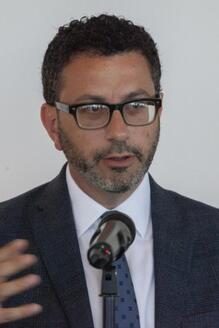|
I joined the Department of Historical and Cultural Studies and the Tri-Campus History Department in 2021. I am also an affiliate of the Centre for European, Russian, and Eurasian Studies at the Munk School of Global Affairs and Public Policy. Previously, I taught in the Department of History at West Virginia University from 2009 to 2021, and served as the 2015-16 Andrew W. Mellon Foundation Rome Prize Fellow in Modern Italian Studies at the American Academy in Rome. From 2007 to 2009, I was a postdoctoral fellow at George Mason University.
I earned my M.A. and Ph.D. from the Department of History at the University of Chicago. I concentrated in modern European history, under the direction of Dr. Michael Geyer. I received my B.A. from Wesleyan University in Classics and the College of Letters, and also studied for a semester at the Intercollegiate Center for Classical Studies in Rome.
|
My intellectual pursuits are constantly evolving. As an undergraduate, I studied classical philology, archaeology, ancient history and philosophy. This in turn led me to the study of the classical tradition and modern representations of antiquity, particularly in the context of twentieth-century Europe. This trajectory culminated in my first book, Excavating Modernity: The Roman Past in Fascist Italy, which examines the Fascist idea of Rome (romanità) and the role played by museologists, archaeologists, classicists, and urban planners in its development and promotion.
As a consequence of studying Fascist political culture for so many years, I became increasingly interested in its enduring traces in contemporary Italy. To this day, it is not uncommon to encounter monuments and buildings erected by Mussolini’s regime across Italy, and the Fascist period is increasingly being cast in nostalgic and valourizing terms by the mass media, intellectuals and politicians. While such revisionism has opened up productive new debates, it also runs the risk of whitewashing a dark episode in Italy’s recent past and legitimizing voices hostile to pluralism and liberal democracy. My current book project goes back to the immediate aftermath of Mussolini’s regime in 1943, in order to understand how the process of exorcising Fascism (or not) conditioned subsequent conceptions of its legacies. I also explore these questions in a transnational and comparative frame, along with my collaborator Lilia Topouzova, in our SSHRC Connection Grant-funded workshop Authoritarianism: Lives, Legacies, Traumas.
As all these projects suggest, I am primarily interested in the politics of commemoration and the institutions and practices – including museums, archaeology, monuments, education, architectural preservation and destruction – through which they are expressed. Our reconstructions of history are themselves historically contingent, and arguably tell us more about ourselves as they do about the past. This emphasis opens space for public engagement; see for example a discussion of my work in the New Yorker; my talk on controversial monuments for the World Monuments Fund and my remarks on the January 6th assault on the Capitol. As historians, we have a responsibility to challenge facile or preconceived narratives, and through nuanced and responsible analysis to show that “it was NOT ever thus.” This role is essential for promoting pluralism, equity, social justice, and liberal democracy.

